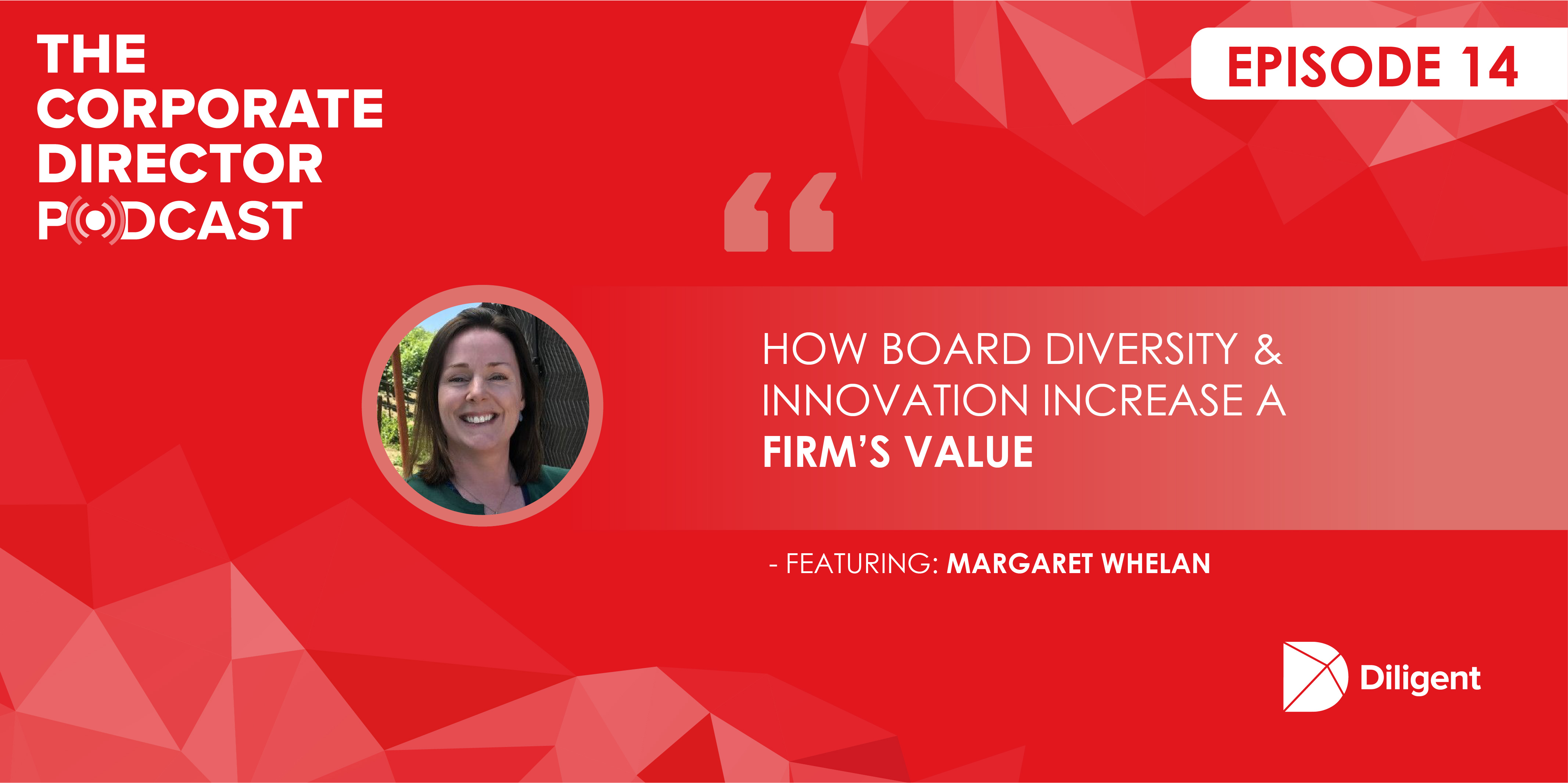Listen to Episode 14 on Apple Podcasts
GUEST: Margaret Whelan, CEO of Whelan Advisory, serves on the boards of the Housing Innovation Alliance, Mattamy Homes, and John Burns Real Estate Consulting
HOSTS: Dottie Schindlinger, VP of Thought Leadership, Diligent, and Meghan Day, Director of Directors’ Experience, Diligent
IN THIS EPISODE:
- Rethinking a Firm’s Value: Balancing innovation with core business investment, the importance of creative thinking, and which measurements matter most
- Board Innovation: How board make-up and practices influence innovation across the organization
- Future Predictions: Whelan’s predictions for future boards in America
HIGHLIGHTS:
Innovation has long been thought of as crucial to an organization’s success. But, too often, there seems to be little innovation (and diversity) within the organization’s board. On this episode of The Corporate Director Podcast, Margaret Whelan shares how boards can rethink value, innovation, growth, and diversity.
1. Rethinking a firm’s value
“All companies must have a growth mindset, but growth in and of itself is not a strategy.”
– Margaret Whelan, corporate director
Growth is crucial, but alone, growth is not a strategy. Wise boards and management should consider the risks and opportunities associated with growth and, particularly, new ventures.
Board directors have two key responsibilities when thinking about the long-term value of a firm: One, keeping their eyes open to the future, especially in an age of digital disruption, and, two, ensuring the CEO and management team are not trapped in a stifling box already, said Whelan. There are endless real-time examples of industries being disrupted by unexpected innovators and challengers, and companies being left behind because the leadership had assumed their core business model would remain unchallenged:
- The hotel industry was disrupted by Airbnb
- Uber upended the cabs and taxis industry
- Amazon continues to threaten traditional retail
Between day-to-day operational challenges and traditional thinking, management can sometimes struggle to see what’s ahead, and directors can fall into the same trap. Whelan said the answer to combating this in-the-box thinking is by promoting a culture of diversity and innovation.
“Value creation is never taking anything for granted — it’s always trying to anticipate what’s around the corner. A good director is doing this all the time.”
— Margaret Whelan, corporate director
2. Board Innovation is at the Core of a Company Performance
A firm’s innovation (or lack thereof) starts within the board itself. First, the board must consider:
- Do we have the right people with the right skill sets in technology, cybersecurity, digital transformation, change leadership, etc.?
- Instead of only thinking about what we are doing well, what could we be doing better?
But, what could be more threatening to your industry, or more rife with opportunity, is that which firms outside your category are doing.
- What is a foreign competitor doing to innovate within your industry?
- What is a company outside of your industry breaking into that could threaten or disrupt your core business?
For instance: Amazon, traditionally a retail threat, is now breaking into the housing industry, which is Whelan’s area of expertise. In this episode, Whelan explains how she stays up-to-date on their movements so that she can handle threats and borrow ideas from their approach.
3. Predictions for the Future
Whelan says the greatest difficulty has been around generational differences. She is an next-gen board member under 50, while most of her board counterparts are male and over 60, meaning that they simply think differently about technology, disruption, and innovation.
Whelan said that effective board refreshment is critical to encourage innovation. Here, Whelan noted how the UK encourages refreshment by enforcing a law that stipulates board members are no longer considered independent once they’ve been on the same board for over 10 years. This lack of independence means they can no longer vote on certain items, such as compensation.
To borrow from this concept, Whelan believes a drastic change in board refreshment would be helpful — she suggested balancing the wisdom of more senior members with a few seats that rotate frequently, where members may serve for only 1 or 2 terms before moving on.
Episode Resources
EY & Corporate Board Member joint report:
- 48% of board directors said either “no,” or “not sure” when asked if their board has the appropriate resources to move the company forward in this new era of digital disruption
- When asked “How attuned is your board and management team to the potential disruption of your organization and industry?”
- 46% said “very attuned”
- 52% said “somewhat”
- 2% “not at all”
ISS report on 2019 U.S. Board Diversity Trends:
- Real estate had the highest percentage of new female directors than any other sector, except for retail utility and semiconductors


